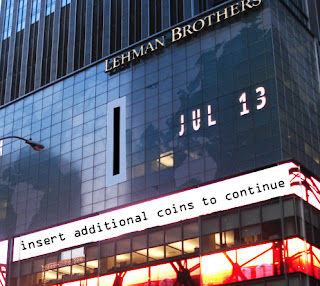Collapse of Lehman Brothers Self-Induced According to New Report

Lehman Brothers chapter 11 examiner's report has become available. Anton R. Valukas, chairman of the law firm Jenner & Block, performed the examination, and points the finger squarely at Lehman for culpability in the fall of the financial giant. Here are some quotes from the L.A. Times regarding the recent report:
"The uncompromising report should put to rest the self-serving claims by Lehman’s ex-Chairman Richard S. Fuld that the firm was destroyed by rumors, short selling, stock manipulation and an unwarranted loss of confidence by clients and trading partners. In 2,200 pages, the examiner, Anton R. Valukas, lays out the truth in all its ugly glory: Lehman's fall was 100% its own fault...
The examination by Valukas...was ordered by the Bankruptcy Court to determine whether there was any fraud or other wrongdoing before Lehman's bankruptcy filing and whether there's any money to be recovered from its executives or business partners.
Valukas found not much of the latter and plenty of the former. He also determined that a government rescue of Lehman, a la Bear Stearns or AIG, was never in the cards -- the firm couldn't find a willing buyer as Bear Stearns had, and unlike AIG it lacked the assets and collateral needed to fund a government bailout loan...
We'll leave aside, for the moment, his disclosure of how Lehman used a clever accounting device to conceal its true fiscal condition. The broader story is its mistimed bet on high-risk lending.
Lehman was not alone on Wall Street in deciding in 2006 to shift out of its old business model of making loans for sale to other investors and into making investments for its own books -- a change Valukas describes as going from the 'moving' to the 'storage' business. But it was acquiring exactly the sort of assets that would be hard to unload in a downturn, such as low-quality mortgages, commercial real estate investments and loans to overleveraged companies.
The downturn arrived in 2007. The spread of the subprime virus prompted other investment banks to flee those assets, but Lehman's brass doubled down, telling the board that with everyone else rushing for the exits, Lehman was poised to reap 'substantial opportunities.'
The firm subjected its portfolio to regular stress testing, which means calculating its potential losses from a range of bad-case scenarios; but it excluded its riskiest real estate and private equity investments from the tests. When the level of its risky holdings exceeded its risk limits, it simply raised the limits. This resembles trying to lose weight by counting calories but leaving cupcakes and ice cream out of the calculation, and fitting into your wardrobe by buying bigger clothes."
But things began to heat up as the recession progressed, leading the company to use shady accounting tricks to dupe investors, auditors, and the market at large into thinking the company was in a better financial state than it actually was.
"Repurchase agreements, or repos, are common enough on Wall Street as a device for short-term financing. You borrow against an asset, subject to an agreement to repay the money, plus interest and a fee, and take the asset back from the lender a few days hence. But the asset remains on your balance sheet.
Repo 105 was different. Lehman booked these deals as sales. This enabled it to take the assets off its balance sheet, making it look smaller and sharply reducing its reported leverage.
In 2007 and 2008, Lehman executives sharply escalated their use of Repo 105, especially near the end of each quarter when the heat was on to show reduced leverage. A few days after quarter's end, of course, the assets were back on its books.
Insiders knew that Repo 105 had no economic purpose but was used solely for window dressing: 'It is another drug we r on [sic],' an executive complained in an internal e-mail. A whistle-blower told Lehman's auditing firm, Ernst & Young, about the extraordinary popularity of Repo 105, but the auditors didn't look into the claim, which Valukas believes may constitute 'professional malpractice.'"
Yet another piece of evidence pointing to how the greed and criminal intent of Wall Street lead to the recession. Want to make sure you never hire any of these dodgy executives to run your corporation? Scroll down through this proxy statement to find their names:
http://www.sec.gov/Archives/edgar/data/806085/000104746908002261/a2183244zdef14a.htm